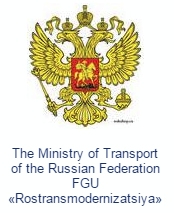International forum
“Marine Industry of Russia”
Moscow, “Gostiny Dvor”
Exhibition Hall,
May 16-18, 2012
Time left till opening of the Forum:
340 days 11 hours 56 minutes
Electronic catalogue
Search for the participant >>>
Enter the site >>>
Forum bulletin
NEWS of marine Forum
February 17, 2011
The crew of tanker “NS Century” owned by Novoship is reported by the Press Service of the shipping company to have defeated the armed attack in Indian Ocean.Sovcomflot tanker defeats armed attack in Indian Ocean
December 14, 2010
New Year special offer! Gift registration fee for participation in Forum till January 15!
October 12, 2010
“It is feasible to develop high-technology relying on domestic resources!”Interview with Lev S. Lazarev, Director General of “Muromsky Radiozavod
An interview with the Managing Director of NavMarine Alexey Migalin
September 27, 2010
“NavMarin OOO” company has been dealing with the integrated navigation systems development, using both in-house and leading global producers’ equipment since 2003. The company also projects and manufactures equipment under its own trade mark Navcom, renders services for equipment installation on vessels of various class, carries on the modernization and improvement of navigation equipment. The company core consists of engineers graduated from the leading Moscow higher educational institutions. At present NavMarine has its own production site in Moscow and research center, a joint production with Guls Plus in Kostroma, warehouse and office premises, retail stores in the shopping center Extreme and one at the 78th km of the Moscow Ring Road. All the NavMarine products are certified by Russian Riverine Register, Russian Maritime Register of Shipping and Ministry of Transport of the Russian Federation.
Mr. Migalin, your company has been on the Russian marine electronics market for over 7 years. In what developments can you take pride?
During this time we have started up a range of products, which gained the lead among the equivalents. These are the flash lights Navcom, Impact, Impact +. We have also developed an in-house product line of fittings for mounting the radars, satellite and communication antennas on various planes of vessel hull. We have managed to develop the low-end radio station (28,000 roubles!) Navcom CPC-300, which outperforms the existing equivalents and 3 types of UHF riverband antennas. All the electronics are certified by Russian Riverine Register. Jointly with the Korean company Intellian Technology we represent in Russia portable satellite antennas under the trade mark Navcom Intellian and the full range of broadband VSAT-antennas for the guaranteed Internet access on board.
Our crowning achievement is the production of a new generation ECDIS, including one for the vessels regulated by Russian Riverine Register. The product is very significant and complicated from the point of view of its development. Apart from the objective of producing the hardware, complying with the requirements of Russian Riverine Register, Russian Maritime Register of Shipping and Ministry of Transport of the Russian Federation, we needed to fulfill the demand of IMO, which specifies the ECDIS functionality on vessels. The other task was to develop the software which also met all those requirements and then to test the product. It was tested on climatic and mechanical stress by Federal State Unitary Enterprise “Tsyclon Test” certified by the Registers to carry on such trials. The tests on its function potentialities were carried on in the laboratory of Admiral Makarov State Marine Academy. All the equipment stood the tests from the very first with no unfavorable criticism.
What developments are the company’s engineers engaged in nowadays?
Now NavMarine is doing two nautical projects. Firstly, we are passing from the development to the trials of power units for the radio stations CPC-300 and ECDIS Navcom Voyager. The power units can be joined up to the other similar equipment.
Secondly, we are going up to testing the GLONASS receiver, which we plan to start producing to the next shipping season. This will help our ECDIS Navcom Voyager to comply with demands of the times as at present it receives GPS signals.
Mr. Migalin, it is a pleasure to realize that our Russian companies, including NavMarine keep step with progress and develop exclusive equipment. But still… Does the home navigation equipment yield to the foreign one? If it does, in what respect it yields?
There is no simple answer to this question. Speaking about professional equipment, we can say “no”, it doesn’t. Moreover, Russian companies take the lead with regard to software. Perhaps, Russian equipment is behind as to its design, but there is no functional and technological inferiority.
The equipment certified in Russia also meets all the European standards and requirements. Russian requirements are even stricter, then those in Europe. Thus, imported specimen of radio transmitters do not comply with the Russian requirements in terms of some parameters. This happens because Russian technical regulations have not been yet adjusted to the European ones, and we still work in accordance with the USSR national standards.
In terms of its technical and functional parameters and design ECDIS is highly competitive with its foreign counterparts; there is no visual difference between them. Turkish and Bulgarian companies have been interested in this product as they have the opportunity to buy more functional and high-quality equipment at less cost.
What are the prospects of Russian producers of navigation equipment? From your point of view, what measures should be taken so that Russian navigation systems were able to meet global competition?
Our business dimension is substantial as it effects the safety of shipping. We are the pioneers – the first developer, the first producer. All the developments involve huge costs. It is desirable for the state and financial institutions to render support to us. Thus, banks could provide project financing, while the state could ease the tax burden and work out special programmes of financing.
Today all the business reposes on its owners. Now the rate on credit is 20%. It’s necessary to start paying the credit off in a month. Where is the money coming from, if the project is put across in a year? We use in our goods the so-called OEM modules, which are manufactured from China to Russia. The sector development is going hand in hand with the production of electronic elements. This sector faces a very strong competitiveness on the services rendered! China and Taiwan press hard, provided that these are the countries just where advanced production lines of microprocessor technology and printed-circuit boards are accumulated. If we want to produce these goods in Russia, then our manufacturers of microprocessor technology should keep to the same price setting as Chinese and Taiwan manufacturers do. Otherwise, we would be at a disadvantage at prices initially. We do not follow the line of developing the full circle production at our facilities as it’s just unprofitable for us. It’s necessary to buy imported production lines etc. to manage the production. So, the costs would be too high. The Russian market of navigation equipment is not a large-scale manufacturing, though our plants have such capacities, but their prices are uncompetitive (they are three-four times higher) and we keep buying in Taiwan. So, that is how we are working now.
Navigation and technical supplying of ships is of great urgency as the safety of shipping depends directly on the quality and standard of the navigation equipment. How do you assess the condition of Russian shipping from this point of view?
The latest ship accidents, which happened on Lake Ladoga and the water storage basin Rybinskoye pointed to a very sad situation. Today the navigation equipment installed on our ships is obsolete and it’s hardly complied with the inspection requirements. Thus, it’s good, if river passenger ships of project 302, 305 are equipped with a GPS receiver and two efficient radars. There are no mapping systems at all, what affects the safety adversely. A lot of new marine equipment aimed at the safety provision has been developed for the last 10-15 years. For instance, it’s AIS, which in practice is not used on river ships contrary to marine ones. Only few shipping companies have installed it on their vessels, proceeding not from safety reasons, but from the Registers demands as these are the vessels of the river-sea class.
Some ships are equipped with personal computers where software for steering a ship on track is installed. But the software did not undergo any tests on its functional potentialities, on climatic and mechanical stress and its electromagnetic compatibility. But the latter parameter is of great importance for shipboard equipment, especially for that one, which is set up in a cabin. As a matter of fact, uncertified equipment can have a strong impact on the other shipboard equipment: it can interfere with its operation, what will affect its indication accuracy and consequently the safety.
The safety level is much higher, if a ship is equipped with electronic mapping navigation systems. But in this case the navigator must be sure, that the map is up-dated. Nowadays up-dating the map is as easy as to make a call to your friend. So, our up-to-date navigation system ECDIS Navcom Voyager with the function of applying the radar display to the electronic map really helps a shipmaster to sail the ship and to make decisions in difficult situations.
Today’s Russian vessel fleet is rundown. A new building is an exception rather than the rule. The electronic mapping of waterways poses a huge problem. At present only the Central European Russia is mapped over. There are no electronic maps of such large rivers as Ob, Lena, Amur, Yenisei with severe climate shipping. But the government has already allocated the money to complete mapping by 2012.
What is the role of the state in settling the problem? Does your company cooperate with government authorities?
Today there are some state-run programmes of shipping re-equipment, inland waterways electronic mapping, development and modernization of port facilities. The government understand the necessity of the shipping development, particularly for economic reasons. It would be desirable, if the government turned to banks with the request to offer Russian developers and manufacturers reasonable programmes of financing.
Meanwhile, our cooperation with the government authorities is limited to control and inspection on their part.
Your company participates in the International Forum “Marine Industry of Russia”, which takes place in Moscow in May. Why have you chosen that particular forum to present your company’s products, developments and services?
The International Forum “Marine Industry of Russia” takes place in Moscow and brings together shipbuilding companies. The forum is a place, where business and power hold discussions. There we can find partners, market our products, influence the settlement of those problems which the industry is facing. It is very important for the document with specific recommendations on how to change the current situation in the industry and how to develop it to be worked out as a result of the forum. It is also essential for the document to be turned over to the government and for the recommendations to be brought to life. Otherwise the industry will keep staying in such sad situation.
The Forum Media Center
Read also:
- September 13, 2010 - New tender offers are posted
- July 02, 2010 - Marine Industry of Russia International Forum sincerely congratulates the work collective of OAO PO Sevmash with the floating out of the lead project 885 nuclear submarine Severodvinsk
- June 15, 2010 - Today Medvedev will participate in the float out ceremony of the new nuclear-powered submarine Severodvinsk
- June 15, 2010 - Final Report on Marine Industry of Russia - 2010 International Forum Held on May 19-21 Published
- May 31, 2010 - We invite you to take part in Marine Industry of Russia - 2011 Forum
© Marine Industry of Russia, 2009-2010. All rights reserved.
By: “Ideological buiseness-projects”
Design by Valentina Ivanova.








